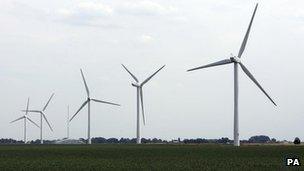How many wind farms? - government asked
- Published

There are said to be 1,826 turbines currently planned for England and 8,581 for the UK overall
A countryside pressure group is calling on the government to say how many more onshore wind turbines will be built and where they will be located.
The Campaign to Protect Rural England (CPRE) says its groups feel "powerless in the face of speculative applications from big, well-funded developers".
Some 1,800 wind turbines more than 30 metres tall (100ft) are currently planned in England.
An industry spokesman said restrictions would put green energy targets at risk.
The CPRE wants to know when the applications will stop and is asking the government to develop a strategic plan which limits the number of turbines in sensitive rural landscapes.
It also wants planning inspectors to put more weight on local concerns.
It says that in 2008 685 turbines more than 30 metres high were built, being built or awaiting approval in the countryside.
But by March of this year, the number had risen to more than 4,100, the CPRE claimed.
Merit approach
Chief executive Shaun Spiers said: "CPRE accepts onshore wind in the right places as part of the mix required to meet the UK's carbon reduction targets, but we are seeing more and more giant turbines sited in inappropriate locations.
"Communities feel increasingly powerless in the face of speculative applications from big, well-funded developers, and this risks undermining public support for the measures needed to tackle climate change."
He said that the government's policies was leading to the "industrialisation of valued countryside".
"The government must take responsibility and set out far more clearly a framework for meeting the country's energy needs while protecting our matchless countryside," he added.
Industry body RenewableUK said 1,826 turbines were currently planned for England, and 8,581 for the UK overall.
The organisation's director of policy, Gordon Edge, said: "Onshore wind is the cheapest source of low-carbon power and restricting its development would jeopardise our firm commitment to offer value for money to the consumer, as well as green energy.
"It's clear that only some locations are suitable for wind, but the way to identify those is by assessing each wind farm on its own merits, not the top-down approach the CPRE is proposing."
Friends of the Earth's head of campaigns Andrew Pendleton said the clean energy produced by wind turbines "is essential for reducing our reliance on expensive fossil fuels and tackling rocketing fuel bills".
"Wind turbines should always be sensitively sited, but one of the biggest threats to our countryside is climate change - and this is exactly what wind power can help defeat."
A government spokesman said the planning system was balancing the needs of the landscape and meeting the UK's targets for clean energy.
- Published29 April 2012
- Published23 April 2012